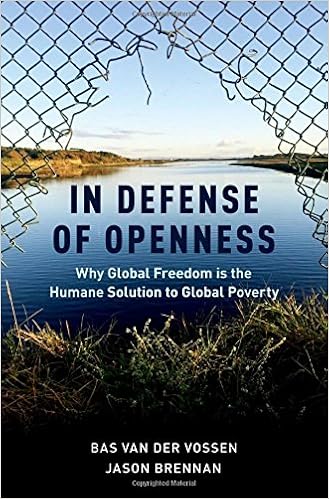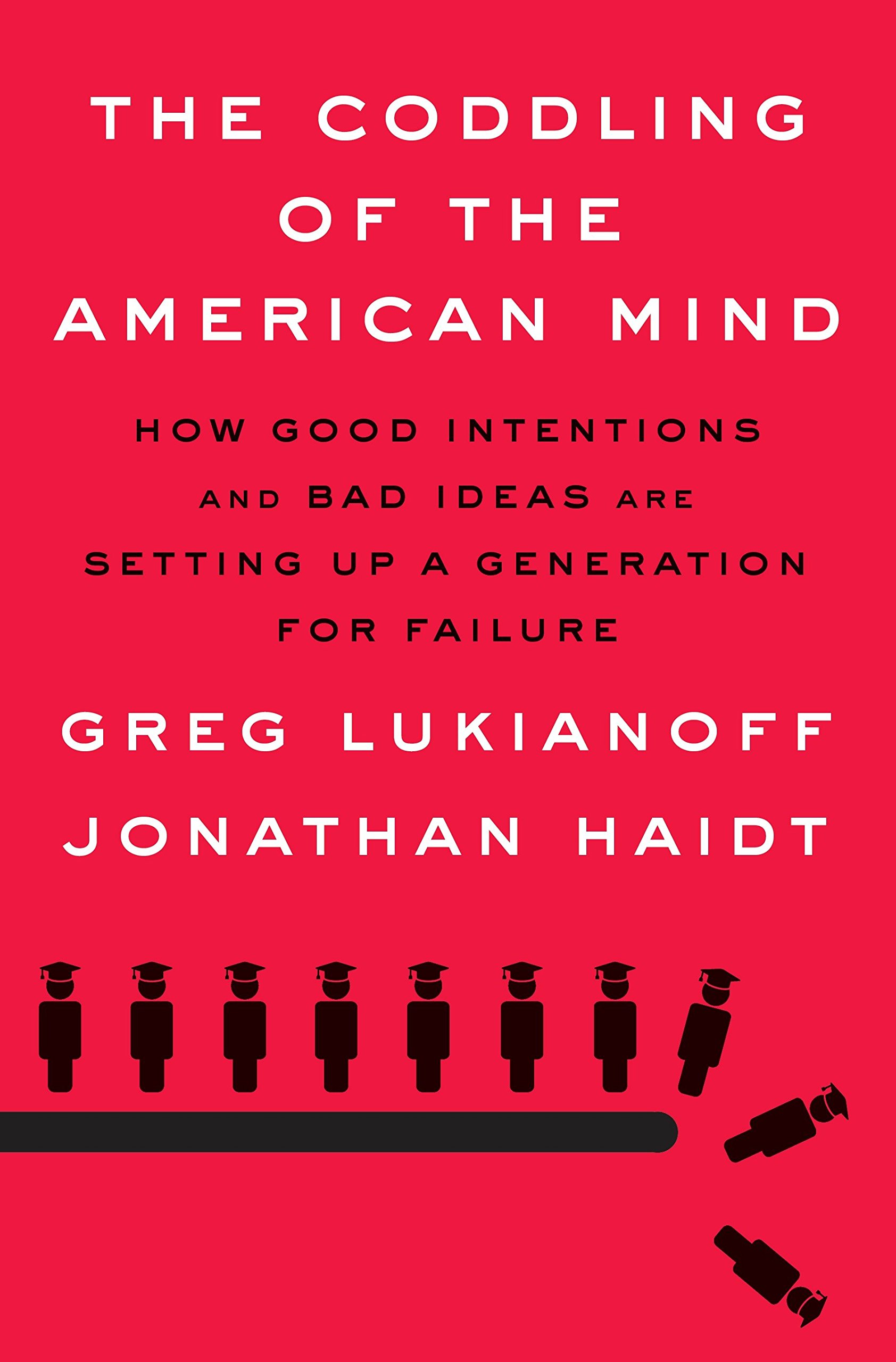This is part of the DR Book Collection.
I’m once again behind on my book reviews, so here’s a list of the books I’ve read recently, their descriptions, and accompanying videos.

Bas van der Vossen, Jason Brennan, In Defense of Openness: Why Global Freedom is the Humane Solution to Global Poverty (Oxford University Press, 2018): “The topic of global justice has long been a central concern within political philosophy and political theory, and there is no doubt that it will remain significant given the persistence of poverty on a massive scale and soaring global inequality. Yet, virtually every analysis in the vast literature of the subject seems ignorant of what developmental economists, both left and right, have to say about the issue. In Defense of Openness illuminates the problem by stressing that that there is overwhelming evidence that economic rights and freedom are necessary for development, and that global redistribution tends to hurt more than it helps. Bas van der Vossen and Jason Brennan instead ask what a theory of global justice would look like if it were informed by the facts that mainstream development and institutional economics have brought to light. They conceptualize global justice as global freedom and insist we can help the poor-and help ourselves at the same time-by implementing open borders, free trade, the strong protection of individual freedom, and economic rights and property for all around the world. In short, they work from empirical, consequentialist grounds to advocate for the market society as a model for global justice. A spirited challenge to mainstream political theory from two leading political philosophers, In Defense of Openness offers a new approach to global justice: We don’t need to “save” the poor. The poor will save themselves, if we would only get out of their way and let them” (Amazon).

Greg Lukianoff, Jonathan Haidt, The Coddling of the American Mind: How Good Intentions and Bad Ideas Are Setting Up a Generation for Failure (Penguin, 2018): “Something is going wrong on many college campuses in the last few years. Rates of anxiety, depression, and suicide are rising. Speakers are shouted down. Students and professors say they are walking on eggshells and afraid to speak honestly. How did this happen? First Amendment expert Greg Lukianoff and social psychologist Jonathan Haidt show how the new problems on campus have their origins in three terrible ideas that have become increasingly woven into American childhood and education: what doesn’t kill you makes you weaker; always trust your feelings; and life is a battle between good people and evil people. These three Great Untruths are incompatible with basic psychological principles, as well as ancient wisdom from many cultures. They interfere with healthy development. Anyone who embraces these untruths—and the resulting culture of safetyism—is less likely to become an autonomous adult able to navigate the bumpy road of life. Lukianoff and Haidt investigate the many social trends that have intersected to produce these untruths. They situate the conflicts on campus in the context of America’s rapidly rising political polarization, including a rise in hate crimes and off-campus provocation. They explore changes in childhood including the rise of fearful parenting, the decline of unsupervised play, and the new world of social media that has engulfed teenagers in the last decade. This is a book for anyone who is confused by what is happening on college campuses today, or has children, or is concerned about the growing inability of Americans to live, work, and cooperate across party lines” (Amazon).

Andrew Selee, Vanishing Frontiers: The Forces Driving Mexico and the United States Together (PublicAffairs, 2018): “There may be no story today with a wider gap between fact and fiction than the relationship between the United States and Mexico. Wall or no wall, deeply intertwined social, economic, business, cultural, and personal relationships mean the US-Mexico border is more like a seam than a barrier, weaving together two economies and cultures. Mexico faces huge crime and corruption problems, but its remarkable transformation over the past two decades has made it a more educated, prosperous, and innovative nation than most Americans realize. Through portraits of business leaders, migrants, chefs, movie directors, police officers, and media and sports executives, Andrew Selee looks at this emerging Mexico, showing how it increasingly influences our daily lives in the United States in surprising ways–the jobs we do, the goods we consume, and even the new technology and entertainment we enjoy. From the Mexican entrepreneur in Missouri who saved the US nail industry, to the city leaders who were visionary enough to build a bridge over the border fence so the people of San Diego and Tijuana could share a single international airport, to the connections between innovators in Mexico’s emerging tech hub in Guadalajara and those in Silicon Valley, Mexicans and Americans together have been creating productive connections that now blur the boundaries that once separated us from each other” (Amazon).

Blaire G. Van Dyke, Brian D. Birch, Boyd J. Petersen (eds.), The Expanded Canon: Perspectives on Mormonism and Sacred Texts (Greg Kofford Books, 2018): “Among the most distinctive and defining features of Mormonism is the affirmation of continuing revelation through modern day prophets and apostles. An important component of this concept is the acknowledgement of an open canon—that the body of authoritative scriptural texts can expand as new revelations are made available and presented to the membership for ratification. This volume brings together both Mormon and non-Mormon scholars to examine the place, purpose, and meaning of the LDS Standard Works (Christian Bible, Book of Mormon, Doctrine and Covenants, and Pearl of Great Price) in the Mormon tradition, as well as the extra-canonical sources that play a near-scriptural role in the lives of believers. Approaching LDS scripture from a variety of disciplines, methodologies, and perspectives, these scholars offer new insights into both the historical and contemporary understandings of Mormon continuing revelation” (Amazon).

Beth Felker Jones, Faithful: A Theology of Sex (Zondervan, 2015): “Many believers accept traditional Christian sexual morality but have very little idea why it matters for the Christian life. In Faithful, author Beth Felker Jones sketches a theology of sexuality that demonstrates sex is not about legalistic morals with no basis in reality but rather about the God who is faithful to us. In Hosea 2:19-20 God says to Israel, “I will take you for my wife forever; I will take you for my wife in righteousness and in justice, in steadfast love, and in mercy. I will take you for my wife in faithfulness; and you shall know the Lord.” This short book explores the goodness of sexuality as created and redeemed, and it suggests ways to navigate the difficulties of living in a world in which sexuality, like everything else, suffers the effects of the fall. As part of Zondervan’s Ordinary Theology series, Faithful takes a deeper look at a subject Christians talk about often but not always thoughtfully. This short, insightful reflection explores the deeper significance of the body and sexuality” (Amazon).

Bessel van der Kolk, The Body Keeps the Score: Brain, Mind, and Body in the Healing of Trauma (Penguin, 2014): “Trauma is a fact of life. Veterans and their families deal with the painful aftermath of combat; one in five Americans has been molested; one in four grew up with alcoholics; one in three couples have engaged in physical violence. Dr. Bessel van der Kolk, one of the world’s foremost experts on trauma, has spent over three decades working with survivors. In The Body Keeps the Score, he uses recent scientific advances to show how trauma literally reshapes both body and brain, compromising sufferers’ capacities for pleasure, engagement, self-control, and trust. He explores innovative treatments—from neurofeedback and meditation to sports, drama, and yoga—that offer new paths to recovery by activating the brain’s natural neuroplasticity. Based on Dr. van der Kolk’s own research and that of other leading specialists, The Body Keeps the Score exposes the tremendous power of our relationships both to hurt and to heal—and offers new hope for reclaiming lives” (Amazon).

Kevin Simler, Robin Hanson, The Elephant in the Brain: Hidden Motives in Everyday Life (Oxford University Press, 2018): “Human beings are primates, and primates are political animals. Our brains, therefore, are designed not just to hunt and gather, but also to help us get ahead socially, often via deception and self-deception. But while we may be self-interested schemers, we benefit by pretending otherwise. The less we know about our own ugly motives, the better – and thus we don’t like to talk or even think about the extent of our selfishness. This is “the elephant in the brain.” Such an introspective taboo makes it hard for us to think clearly about our nature and the explanations for our behavior. The aim of this book, then, is to confront our hidden motives directly – to track down the darker, unexamined corners of our psyches and blast them with floodlights. Then, once everything is clearly visible, we can work to better understand ourselves: Why do we laugh? Why are artists sexy? Why do we brag about travel? Why do we prefer to speak rather than listen? Our unconscious motives drive more than just our private behavior; they also infect our venerated social institutions such as Art, School, Charity, Medicine, Politics, and Religion. In fact, these institutions are in many ways designed to accommodate our hidden motives, to serve covert agendas alongside their “official” ones. The existence of big hidden motives can upend the usual political debates, leading one to question the legitimacy of these social institutions, and of standard policies designed to favor or discourage them. You won’t see yourself – or the world – the same after confronting the elephant in the brain” (Amazon).

Michael D. Tanner, The Inclusive Economy: How to Bring Wealth to America’s Poor (Cato Institute, 2018): “The Inclusive Economy: How to Bring Wealth to America’s Poor energetically challenges the conventional wisdom of both the right and the left that underlies much of the contemporary debate over poverty and welfare policy. Author and national public policy expert Michael Tanner takes to task conservative critiques of a “culture of poverty” for their failure to account for the structural circumstances in which the poor live. In addition, he criticizes liberal calls for fighting poverty primarily through greater redistribution of wealth and new government programs. Rather than engaging in yet another debate over which government programs should be increased or decreased by billions of dollars, Tanner calls for an end to policies that have continued to push people into poverty. Combining social justice with limited government, his plan includes reforming the criminal justice system and curtailing the War on Drugs, bringing down the cost of housing, reforming education to give more control and choice to parents, and making it easier to bank, save, borrow, and invest. The comprehensive evidence provided in The Inclusive Economy is overwhelming: economic growth lifts more people out of poverty than any achievable amount of redistribution does. As Tanner notes, “we need a new debate, one that moves beyond our current approach to fighting poverty to focus on what works rather than on noble sentiments or good intentions.” The Inclusive Economy is a major step forward in that debate” (Amazon).